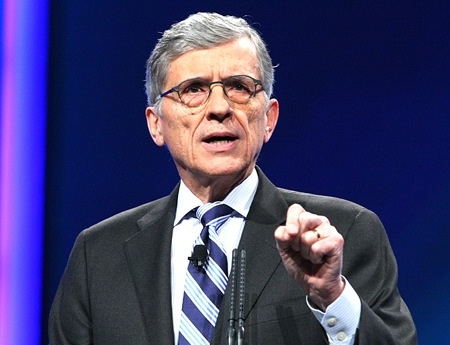FCC's Wheeler Pulls Votes on BDS, Other Items

The smarter way to stay on top of broadcasting and cable industry. Sign up below
You are now subscribed
Your newsletter sign-up was successful
FCC chairman Tom Wheeler has apparently acceded to Republican requests and has pulled votes on four controversial items—at least in the sense of not having Republican backing—including the business data services (BDS) revamp.
Also off the agenda for the Nov. 17 public meeting, according to a "deletion of agenda items" notice, was a vote on classifying LTE VoIP, rules for the second phase of its USF mobility fund allocations, and boosting the amount of video described programming for the blind and vision-impaired.
The items remain on circulation, which means they could theoretically still be voted, but that is unlikely.
“We are disappointed that the FCC will not act on the previously announced November agenda," said Harold Feld, SVP of Public Knowledge. "While respecting the tradition that the FCC should generally wait for the new administration before acting on any new initiatives, these items were essentially completed and ready to move. It seems absurd that if Chairman Wheeler had scheduled the meeting on election day, we would have already resolved the decade-old proceeding on legacy business data services pricing.
“More importantly, the agenda items address real and pressing problems in the broadband marketplace. These problems do not simply go away due to an administration change. When Republicans take over, they will need to address the same competitive problems, or explain to the American people why they plan to perpetuate our broadband duopoly.”
Republican legislators, citing precedent when Dems took over the White House in 2008, this week asked Wheeler to ramp down his regulatory agenda.
The FCC had heard from both sides of the Hill, at least Republicans on both sides, that it should focus on wrapping up current projects with consensus support rather than vote any new controversial regulatory proposals—among the most prominent of the latter are BDS revamps—which had been scheduled for that vote Nov. 17—and a set-top box "unlocking" proposal that is currently on circulation but has shown no signs of being voted as yet.
Sen. John Thune (R-S.D.), chair of the Senate Commerce Committee, Tuesday wrote Wheeler to send that message. He did not suggest canceling the Nov. 17 public meeting and even said there were some items the FCC could deal with. He didn't say which those were, though he did say "consensus items," which would exclude the BDS item that is opposed by the Republican commissioners.
The smarter way to stay on top of broadcasting and cable industry. Sign up below
"Leadership of the Federal Communications Commission (FCC) will soon change," Thune wrote. "Congressional oversight of the execution of our nation's communications policies will continue. Any action taken by the FCC following November 8, 2016, will receive particular scrutiny. I strongly urge the FCC to avoid directing its attention and resources in the coming months to complex, partisan, or otherwise controversial items that the new Congress and new Administration will have an interest in reviewing. There are certainly many consensus and administrative matters on which the Commission can instead focus its energies to conclude, including several items currently on the agenda for the Open Meeting scheduled to occur on November 17, 2016."
The chairs of the House Commerce Committee and Communications Subcommittee also sent a letter cautioning against action on controversial items.
That was fine with the Republican commissioners.
"During the last presidential transition, the Commission Chairman wisely heeded the will of Congress in setting aside any remaining controversial agenda items for the next Congress and Administration to consider," said Republican FCC commissioner Michael O'Rielly of the letters from both House and Senate Republicans. "I thank the current leadership of both Senate and House Commerce Committees for calling this precedent to everyone’s attention today, and expect that Chairman Wheeler will honor their request.”
"I welcome the letter from Chairman Fred Upton of the House Energy and Commerce Committee and Chairman Greg Walden of the House Subcommittee on Communications and Technology and the letter from Chairman John Thune of the Senate Commerce, Science, and Transportation Committee calling on the FCC to halt further action on controversial items during the transition period," said FCC commissioner Ajit Pai, who is likely to be at least interim chairman once Donald Trump takes the oath of office. He had also called for pulling the four major items.
"Eight years ago, then-Senator John Rockefeller and then-Representative Henry Waxman called on the FCC not to consider 'complex and controversial items that the new Congress and new Administration will have an interest in reviewing.' Then-Chairman Kevin Martin abided by their request. I hope Chairman Wheeler follows his example and honors the wishes of our congressional leaders, including by withdrawing the four major items on the November meeting agenda."
Contributing editor John Eggerton has been an editor and/or writer on media regulation, legislation and policy for over four decades, including covering the FCC, FTC, Congress, the major media trade associations, and the federal courts. In addition to Multichannel News and Broadcasting + Cable, his work has appeared in Radio World, TV Technology, TV Fax, This Week in Consumer Electronics, Variety and the Encyclopedia Britannica.

